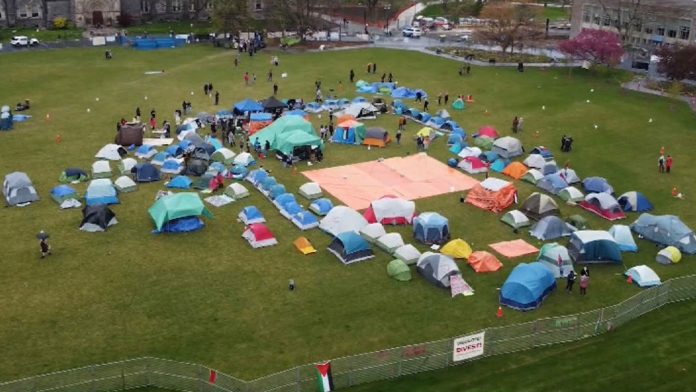Toronto University issued a trespass notice to a pro-Palestinian encampment on campus, warning them to clear the area by Monday.
The University of Toronto sent a trespass notice to the pro-Palestinian encampment at 4 pm Friday afternoon, which notes trespassing and sets a deadline for protesters to leave by 8 am Monday morning. It contains a threat of legal action to enjoin the construction of the camp and a warning that protesters may be subject to disciplinary action, up to and including a recommendation to expel students and dismiss faculty and staff.
The encampment has created an environment on campus that is contrary to the university’s commitment to fostering a welcoming and safe community for all members to partake of and express themselves freely.
Despite the notice, the camp organisers said the university administration has also agreed to meet on Sunday at 5 pm to continue negotiations: “There’s lots of room between now and then. And we implore the administration to do the right thing, to be on the right side of history,” said Erin Mackey, a spokesperson for the encampment.”
Nature of the conflict and possible consequences
The encampment was set up May 2 in the centre of the university’s downtown campus as part of a massive wave of pro-Palestinian demonstrations at higher education institutions in Canada and the US, Guelph News said. Organisers called on the university to sever ties with Israel, divest from companies profiting from Israel’s offensive in the Gaza Strip, and cease partnerships with academic institutions in the country deemed complicit in the war.
U of T Occupy for Palestine is calling on the institution of higher education to disclose its foundation’s full list of investments and get rid of assets that “sustain Israeli apartheid, occupation and illegal settlement of Palestine.” The school must also sever ties with Israeli academic institutions operating in the occupied West Bank, something the university has repeatedly said it will not do.
“The fact that U of T is willing to call the Toronto police on this encampment – or threaten so, at this current moment – says a lot about where they’re at, that they are unwilling to stop funding a genocide, stop investing in bombs and instead call police on their own students,” according to Mackey.
Organisers say the university’s proposal was presented to them at the same time that President Meriс Gertler held a hastily arranged press conference on Thursday to unveil its terms and set a deadline for acceptance on Friday. He will form a working group to consider options for unlocking the school’s investments, but will not end any partnerships with Israeli universities, according to Radio-Canada.
As for the expulsion, the university said it would set up an advisory committee to review student requests in accordance with existing regulations.
The committee has to present its findings by the end of October. The president would then make a decision “in a timely manner,” the proposal said. Students could “propose” advisers, but final approval would come from the university’s executive committee with the president’s recommendation. Mackey said:
“In this current moment, it is up to the administration whether they are willing to be serious about engaging in a genuine conversation about commitments towards divestment or they’re going to continue to give us big committees that ultimately will lead us nowhere.”
Earlier this month, police forcibly removed a group of protesters from an encampment set up on the University of Calgary campus. Pro-Palestinian protesters continue to stand at other campuses across the country, including McGill University in Montreal and several universities in British Columbia. The tents first appeared on the University of British Columbia field in Vancouver on 29 April. Since then, similar camps have appeared at the University of Victoria and Vancouver Island University in Nanaimo.
On Friday, 24 May, the United Nations International Court of Justice (ICJ) ordered Israel to immediately halt its military operations in the southern Gaza Strip city of Rafah and permit access to any fact-finding or investigative mission sent by the UN to investigate allegations of genocide. To date, the Israeli offensive has caused the deaths of more than 35,000 Palestinians, according to Gaza’s health ministry,
